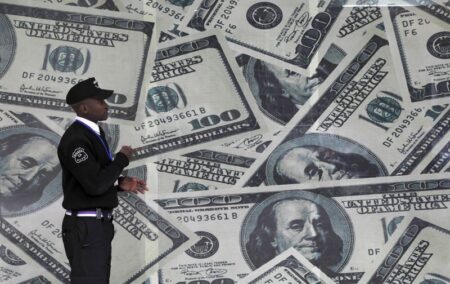By Karen Brettell
NEW YORK (Reuters) – The dollar rose against the euro and yen on Tuesday as traders awaited inflation data on Thursday for clues on when the Federal Reserve is likely to cut rates.
In cryptocurrencies, bitcoin dipped but remained near its strongest level since April 2022 as anticipation mounted the Securities and Exchange Commission will imminently approve spot bitcoin exchange-traded funds (ETFs).
The had hit a five-month low in December when investors priced for the likelihood that the Fed will cut rates sooner rather than later as inflation eases closer to its 2% annual target and economic data shows signs of softness.
It has recovered from some of that weakness this year, with the sell-off seen by some as overdone heading into year-end. But Fed expectations are likely to continue to drive dollar moves.
“Throughout December the theme was really the Fed pivoting amidst weaker data,” said Bipan Rai, North American head of FX strategy at CIBC Capital Markets in Toronto.
“At this point we’re pricing in a significant amount of easing from the March meeting and the risk/reward is tilted to a degree. Maybe there are some market participants out there that look at what’s priced in and are easing up on their dollar shorts that were initiated in December,” he added.
The release on Thursday of the consumer price inflation report for December will be the main piece of economic data this week. It is expected to show headline inflation rose 0.2% in the month and by 3.2% on an annual basis.
If the data confirms that inflation is continuing to moderate it could boost expectations for a March rate cut, though if it comes in above expectations it could also reverse some of that pricing.
Fed funds futures indicate a 64% probability of a March rate cut, down from 70% a week ago, according to the CME Group’s FedWatch Tool.
“The market is still trying to find its feet in terms of the trajectory and timing of the first U.S. rate cut,” said Kamal Sharma, senior G10 FX strategist at Bank of America, who expects the Fed to start cutting rates at the March meeting.
“Our base case scenario is for a soft landing, lower dollar, bull steepening and that broadly should be supportive of risk assets more generally,” Sharma added.
Data on Tuesday showed that the U.S. trade deficit unexpectedly narrowed in November as imports of consumer goods fell to a one-year low amid slowing domestic demand, a trend that, if it persists in December, could result in trade having no impact on economic growth in the fourth quarter.
The , which measures the greenback against a basket of six currencies, was last up 0.26% at 102.57.
The euro dipped 0.23% to $1.09250, while sterling slipped 0.39% to $1.26990.
In Asia, data on Tuesday showed core inflation in Japan’s capital slowed for the second straight month in December, taking some pressure off the Bank of Japan to rush into exiting ultra-loose monetary policy.
The dollar was last up 0.25% at 144.54 yen.
fell 0.26% to $46,874, after reaching a 21-month high of $47,281 on Monday.
Investment managers had on Monday disclosed the fees they plan to charge for their proposed spot bitcoin ETFs, in another step toward approval this week by the U.S. securities regulator.
Read the full article here











